Sen. Jeff Flake (R-Ariz.) said the North American Free Trade Agreement should be continued and warned that terminating NAFTA could have a negative effect on security at the U.S.-Mexico border.
Flake mentioned at a town hall meeting in Gilbert, Ariz., last month that he recently met with ranchers in Nogales, Ariz.
“It’s gorgeous down south. They really had a good year. The ranchers are happy in that regard but also happy in that border crossings are down significantly. It has been a trend that’s been over the past several years, but it is at the lowest level in about 30 years right now – that’s due to a number of factors,” Flake said. “The biggest of which is the economy, particularly in Mexico is doing well, largely because of NAFTA. One of the big factors is NAFTA.”
“That is one of the concerns I have about where we are going on trade – the other implications that it has on border security,” he said. “But in the bipartisan immigration bill passed in 2013 out of the Senate that did not go anywhere in the House, there were significant border investments.”
The senator noted that there are “areas in some of the towns where we need better walls or fences as we go out of the cities.”
“There are some areas, I can tell you, along the border that do not lend themselves to a wall or a fence or just about any barrier, but are best dealt with by surveillance – and so when people talk about one solution on the border, they haven’t traveled the border. When you talk to the ranchers there, you have a lot of different issues that come up all the time. If you go down in Cochise County, if you are near Naco, it is a watershed,” he added. “The water flows north not south and so you can’t have a wall. Obviously, you have to have a fence with storm gates that open when floods happen. So, it is a different kind of border infrastructure than many envisioned.”
Flake said there is “good cooperation” between local law enforcement and the federal government in Arizona. While technology has contributed to improved border security, Flake said the U.S. still has to be “concerned” about drug smuggling and the “prospect of terrorism.”
He expressed concern with President Trump’s rhetoric toward Mexico.
“So we are in a better situation on the border than we have been in a while and we just have to build on those improvements and recognize that any event might change the equation significantly. For example, if Mexico, in their elections next year, were to elect a populist, maybe leftist government, that might change the trajectory of the government there in terms of privatization, trade and could affect their economy significantly. Then we would face pressures again. And that’s one big concern I have, not just the policy we have with Mexico but the rhetoric we have with Mexico,” he said.
“If we gin up anti-American sentiment in Mexico, it might lead to or aid the election of a leftist government there that would not be to our benefit here in Arizona or in the United States,” the senator added. “But the border – there is better cooperation. We have continuing infrastructure improvements.”
Flake argued that NAFTA has been “good for Arizona.”
“Obviously it needs to be modernized, but it needs to be continued, not abandoned,” he said. “And I am concerned where the party might go there.”
Flake told the audience that the deficit and national debt is the greatest challenge facing the U.S.
“The biggest by far is our looming debt and deficit. We have a debt of $20 trillion. We have a deficit that is about $600 billion now and, over the next decade, we will get back over $1 trillion a year – that is not sustainable. It’s simply not. At some point, I fear the financial markets, we will wake up one morning and the markets will have already decided we’re not such a good bet,” he said.
“When that happens, it takes decades, generations, to grow out of it. Other countries – Japan, Greece, and others – are finding that out. I do not want to be in that situation. I want to fix this kind of thing before we get there, and you can only do that if you work across the aisle,” he added.
Flake said one political party is not going to act alone and take the political risk of significantly reducing spending to get control of the deficit.
“If you look at any good budget agreement we’ve had over the past 40 years, that has put us on a more sustainable path with regard to Social Security or Medicare or entitlement programs in particular, it happened when Republicans and Democrats sat down together and said ‘let’s share the political risk,’ because one party, when that party controls both chambers and the White House, whether it’s Republicans as it is now, or Democrats, that party will never take the chance because midterm elections are never more than two years away and that party will never do it on its own,” he said.
“I think with this vitriol we have and this inability to compromise – it is in my view, as a conservative, it is preventing us from achieving conservative ends, and we’ve got to get away from this notion that it’s a bad thing to sit down and work across the aisle,” Flake added. “It’s disheartening to be in that situation where you’re attacked if you realize we need a bipartisan solution for something.”









Join the conversation as a VIP Member